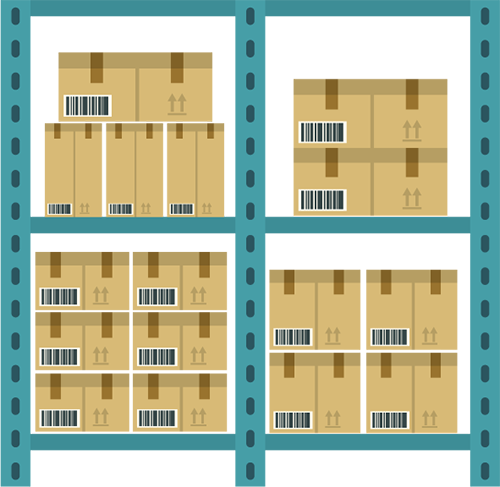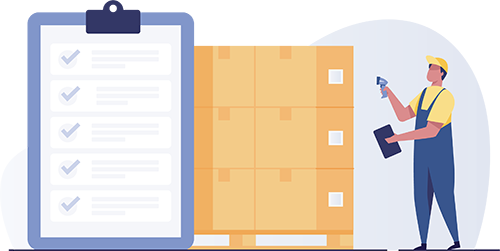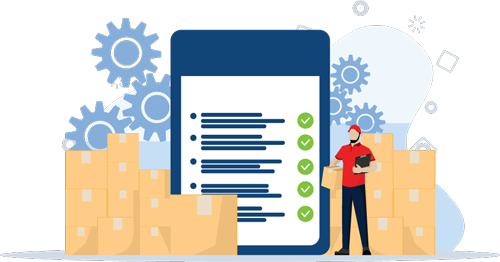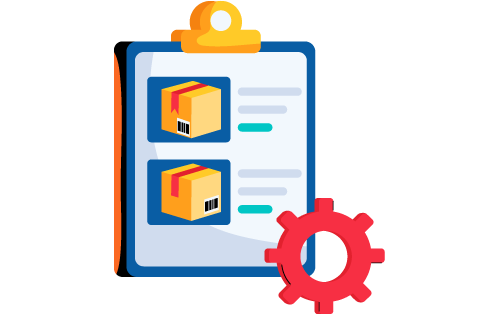What is a lot number?
Built For

Have you ever wondered how companies can quickly pinpoint a batch of products causing issues, be it your favorite snack, lipstick, or even the medicine you rely on? Or perhaps, while trying to open your package of potato chips, you stumbled upon a cryptic set of numbers and thought, “What’s this? A secret code?” Well, sort of! Enter the world of “lot numbers” – the digits that play a pivotal role in ensuring that the products we consume are safe and up to the mark.

In our everyday life, we often overlook these tiny details. Yet, they serve as a crucial link in the supply chain, connecting manufacturers, regulators, and consumers in a dance of quality, safety, and trust. If you’re curious about this magical set of numbers, stick around. We’re exploring the question, “What is a lot number?” – and, in the process, uncovering why they matter more than you might think!
What is a lot number?
A lot number is a unique identifier given to a batch or group of products. These products have been produced, processed, or packaged under almost identical situations. Consider the lot number as a “family name” for products, indicating their common “upbringing” or production environment.
Lot numbers vs. serial numbers
Lot Number
Imagine a batch of chocolate chip cookies baked in a wholesale bakery on the same day, using the same ingredients, in the same oven. All these cookies would share the same lot number since they hail from the same batch and have been baked under similar conditions.
Example: A particular brand of sunscreen produced on June 1st, 2023, in Factory A might all share the lot number “A-060123”.
Serial Number
Now, picture if each chocolate chip cookie had its unique ID, distinguishing it from its siblings. That’s a serial number for you. It’s a one-of-a-kind identifier for individual items, even if they come from the same lot.
Example: Each laptop from a particular brand will have its unique serial number, even if produced on the same day and factory. So, while two laptops might share the lot number indicating they were made on the same day at the same place, their serial numbers will be different, ensuring they can be individually identified.
Why the Distinction Matters
“Tomayto, Tomahto,” you might say. But in the world of product manufacturing and quality control, this difference is paramount! Knowing whether a product originates from a whole batch or an individual item can drastically change how companies handle recalls, warranties, or quality concerns.
For instance, if there’s a malfunction with a specific smartphone model, checking its serial number might reveal that the issue is isolated to that single device. But if multiple devices from the same lot number face the same problem, it’s a sign that there might have been a hiccup during that particular production batch.
While both numbers play a pivotal role in product identification and traceability, they serve distinct purposes in ensuring quality, safety, and accountability.
What is a Lot Number? It’s More Than Just Numbers
To the uninitiated, lot numbers might seem like a random string of characters printed on products. But in reality, they’re like a product’s “biography,” telling tales of its origin, production, and journey.
Traceability in manufacturing and production
Imagine being a detective but for products. If something goes amiss, lot numbers are your best friend. They act like breadcrumbs, helping industries trace back through the supply chain to pinpoint where things might have gone wrong. Whether it’s tracking down the source of a contaminated ingredient or identifying a faulty batch, lot numbers help save the day.
Recall effectiveness
No one likes product recalls, but they’re necessary to ensure consumer safety. When a product batch has issues, the lot number allows manufacturers to identify and pull affected items from the shelves swiftly, minimizing consumer risks.
Quality control, assurance, and consistency
Quality is king. And, in the vast world of production, maintaining consistent quality can be quite the challenge. Enter lot numbers. By grouping products of similar production conditions, lot numbers enable manufacturers to monitor and ensure consistent quality. If a product from a particular lot receives complaints, manufacturers can quickly check the entire batch, ensuring that every product maintains the gold quality standard.
Regulatory and compliance
Regulations aren’t there to complicate life; they’re crucial for maintaining industry standards and ensuring consumer safety. For many industries, especially food, pharmaceuticals, and cosmetics, having a lot number system isn’t just good practice – it’s a regulatory must. It ensures transparency and allows regulatory bodies to verify that products meet the required standards.
Building trust with consumers
In the end, lot numbers aren’t just for the manufacturers or regulators; they’re for us, the consumers. They symbolize transparency and accountability. Knowing that a company can trace every product back to its roots builds trust, assuring consumers that they purchase safe, high-quality products.
Industries that Utilize Lot Numbers

While we may only notice the humble lot number sometimes, they work tirelessly behind the scenes in various industries, safeguarding our health, safety, and comfort. At this point, the next time you come across the series of numbers, you probably will no longer think, “What is a lot number?” instead, you’ll take a moment to appreciate the vast network of checks and balances it represents.
The lifesavers’ code for Pharmaceuticals
Lot numbers are integral in the pharmaceutical world, ensuring every pill, syrup, or injection is up to the mark. Suppose a batch of medicine is found to be below par or contaminated. In that case, the lot number makes locating and removing them more straightforward, ensuring that what ends up in our medicine cabinets is safe and effective.
From farm to table: Food and Beverages
Whether it’s your morning coffee, the sandwich you grabbed for lunch, or that midnight snack, lot numbers are everywhere in the food and beverage sector. Lot numbers help trace products back to their sources, ensuring that the affected products can be identified and removed swiftly if there’s an outbreak of foodborne illness or contamination.
Beauty with accountability: Cosmetics
Your favorite lipstick, foundation, or moisturizer comes with more than promises of beauty; they come with safety assurance. Lot numbers in cosmetics ensure that if a particular product causes adverse reactions or doesn’t meet quality standards, the entire batch can be checked and, if necessary, recalled.
Precision in every component with Electronics
From the phone in your hand to the laptop on your desk, electronics are a staple in modern life. Given the complexity of these gadgets, ensuring that each component is of top-notch quality is essential. Lot numbers help in identifying batches of components or devices that might be faulty, ensuring the reliability of our beloved technology gadgets.
Across many more industries
From automotive parts that keep our cars running smoothly to the clothes that define our style, lot numbers are omnipresent. Lot numbers maintain quality, safety, and consistency across many sectors, proving their universal importance.
Technological Solutions for Lot Number Management
As businesses grow and evolve, so too must their technology systems. Embracing technologies like barcoding and inventory management software simplifies lot number management and propels businesses into a new era of efficiency, accuracy, and growth.
Managing lot numbers with inventory software
Along with its many features, inventory software’s centralized database, real-time tracking, and automated alerts and notifications, streamline lot number management and, in the event of a recall, simplify the product recall process.
Centralized database
- Unified access. No more shuffling through piles of paperwork or multiple systems. A centralized database can access all lot numbers, product details, and associated data from a single platform.
- Consistency & standardization. A single source of truth ensures that data is consistent, reducing the chances of discrepancies, which can lead to operational inefficiencies.
- Regulatory adherence. For industries with stringent regulatory requirements, inventory software can help ensure compliance by maintaining necessary records and documentation.
Real-time tracking
- End-to-end traceability. By combining the power of barcodes with inventory software, every step of a product’s journey can be tracked—from manufacturing to end consumers.
- Instant updates. As items move through the supply chain, their status gets updated in real-time through barcode scans, providing a current view of inventory levels, shipment statuses, and more.
- Enhanced visibility. Stakeholders can track the progress of products, right from manufacturing to the end consumer, fostering transparency.
Automated alerts and notifications
- Proactive management. Whether it’s a product lot nearing its expiration, a recall notice, or stock running low, automated alerts ensure that necessary actions are taken promptly.
- Real-time monitoring. Continuous tracking of lot-specific metrics, such as quantity, location, and status, ensures that potential issues are flagged immediately.
Simplified product recalls
In case of defects or potential health hazards, products from a particular lot can be swiftly identified and recalled, protecting brand reputation and consumer safety.
Lot numbers and barcoding
Barcoding has revolutionized lot management by bridging the physical and digital realms, making processes faster, more accurate, and more efficient, benefiting businesses and consumers alike.
Speed & Efficiency

- Instant access: A simple scan provides instant access to all relevant product information, eliminating the need to search through records manually.
- Bulk processing. Multiple items can be processed rapidly, making tasks like inventory checks or order processing significantly faster.
- Reduced human intervention. With automated scanning, the chances of manual entry errors are minimized, ensuring more accurate data handling.
- Efficient check-ins and check-outs. As products enter or leave a facility, they can be easily scanned into the system, updating the inventory database in real time.
Accuracy
- Error reduction. Manual data entry is prone to mistakes, but with barcodes, the chances of such errors plummet dramatically. This is crucial for lot management, where precise identification can differentiate between safe operations and significant mishaps.
- Consistent data entry. Barcoding ensures a standardized data input method, ensuring consistency across all scanned items.
Case Study: Harvest Valley Bakery Answers “What is a Lot Number? and How Can We Use Them Easier?” with Acctivate
Harvest Valley Bakery has built a reputation for producing private-label products such as cookies and breakfast bars. The bakery has always prioritized quality and innovation. Registered with the FDA and having a peanut-free facility with a stellar USDA inspection rating of 97%, Harvest Valley showcases its commitment to excellence. Harvest Bakery turned to Acctivate Inventory Software to solve its inventory and lot number challenges.
The Challenge
Inefficient lot number tracking
Harvest Valley’s previous software solution needed help managing lot numbers, mainly when variations occurred in their dough batches due to humidity or differing ingredient sources. This inefficiency posed significant risks, especially when it came to product recalls.
The Acctivate Solution
In addition to delivering an advanced inventory, order, recipe, and business management solution, Acctivate’s lot number functionality provides Harvest Valley:
- Enhanced traceability: Acctivate’s traceability functionality tracks products from raw ingredients to finished goods backward and forward. This comprehensive view ensures that in the event of a potential product recall, Harvest Valley has all the necessary information at its fingertips.
- Efficient lot number management: Acctivate’s Track & Trace feature became an instant favorite for Harvest. The tool simplified the complex and lengthy lot numbers, presenting them in an easily digestible format. During mock recalls, what previously took hours of sifting through paperwork can now be accomplished in seconds.
Impact & Results
- Time savings. With Acctivate, the once tedious task of entering and managing lot numbers became a breeze. Errors were eliminated, like transposing numbers, which could have dire consequences in real recall situations.
- Enhanced recall preparedness: Harvest Valley has never experienced an actual product recall, but their frequent mock recalls became more efficient with Acctivate. Customizable reports collate all necessary data swiftly, ensuring they are always ready for any eventuality.
Summary: “What is a lot number?”
What is a lot number?
A lot number is a unique code assigned to a batch of products manufactured under similar conditions.
How does a lot number differ from a serial number?
While a lot number is assigned to a group of products from the same batch, a serial number uniquely identifies an individual item. Lot numbers track batches, whereas serial numbers track single items within those batches.
Why are lot numbers important?
Lot numbers are critical for traceability, recall efficiency, quality control, and regulatory compliance. They help companies quickly identify and address issues within a specific batch of products, ensuring consumer safety and product consistency.
What industries use lot numbers?
Lot numbers are used across various industries, including pharmaceuticals, food and beverages, cosmetics, electronics, and many others, where tracking, safety, and quality are essential.
How does inventory software help with lot number management?
Inventory software aids in managing lot numbers by providing a centralized database for tracking, real-time updates on product movement, and automated alerts for recalls and quality control, thus enhancing the efficiency and accuracy of managing products.
What are the advantages of using barcoding with lot numbers?
Barcoding increases the speed and efficiency of tracking lot numbers, reduces human error, and provides instant access to product information. It also ensures accuracy and consistency in data entry.
Can lot numbers prevent recalls?
While lot numbers cannot prevent recalls, they enable businesses to quickly identify and recall the affected products, limiting the impact and ensuring customer safety.
Are lot numbers visible to consumers?
Lot numbers are typically printed on product packaging, allowing consumers to track the batch of the purchased product.
Call us at 817-870-1311




